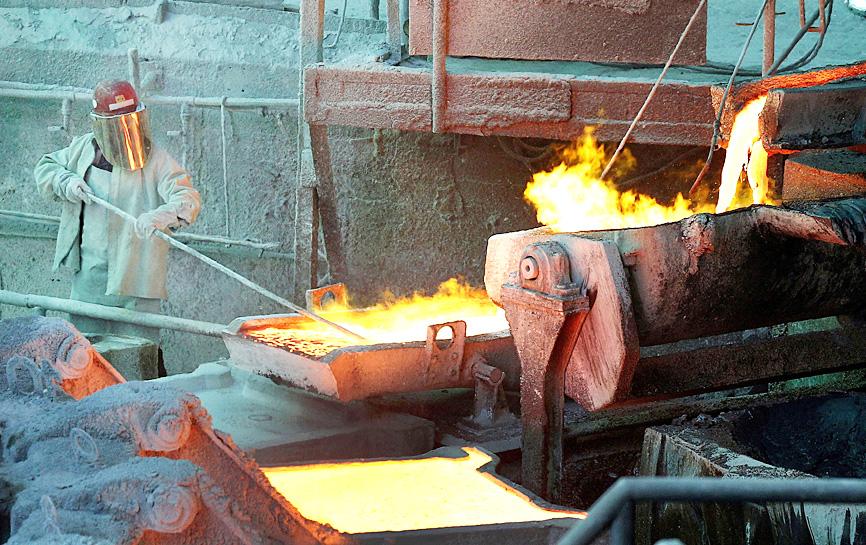Three unions from state mining enterprise CODELCO, the largest producer of copper in the world, are on strike after rejecting a new labor agreement, a union leader said on Tuesday.
The Suplant union began a strike on Tuesday at the Andina mining division to join two other unions that started industrial action last week. It comes just days after Anglo-Australian mining giant BHP reached a deal with workers at the world’s biggest copper mine, Escondida, also in Chile, to avoid strike action there.
The Andina unions have rejected a new labor agreement that would remove health benefits for new employees, as well as compensation related to years of service.

Photo: Reuters
“Suplant is declaring a strike because CODELCO’s executives want to reduce labor costs by removing health and taking away the rights to compensation for years of service, and we won’t allow it,” Suplant president Clodomiro Vasquez said.
The Andina division comprises the underground Rio Blanco mine and the open air Sur Sur mine, which together produced more than 184,000 tonnes of copper last year.
The three striking unions represent 1,300 of the 1,437 Andina workers.
The other two unions — the Industrial Union of Labor Integration and the Unified Union of Workers — released a statement saying “there has been a tremendous effort during the pandemic” and that they worked “under extreme cold and heat, exposed to physical and chemical risks ... mental burden and overwork.”
CODELCO, which produces 8 percent of the world’s copper, said the offer “represents the company’s maximum effort.”
While much of Chile was put under lockdown at times during the COVID-19 pandemic, the vital mining industry was always kept operational.
Chile is the world’s largest copper producer with 5.6 million tonnes a year, which makes up 28 percent of global output, much of which is sold to China, the world’s biggest consumer. Mining makes up 10 to 15 percent of its GDP and half of its exports.

Taiwan Semiconductor Manufacturing Co (TSMC, 台積電), the world’s biggest contract chipmaker, booked its first-ever profit from its Arizona subsidiary in the first half of this year, four years after operations began, a company financial statement showed. Wholly owned by TSMC, the Arizona unit contributed NT$4.52 billion (US$150.1 million) in net profit, compared with a loss of NT$4.34 billion a year earlier, the statement showed. The company attributed the turnaround to strong market demand and high factory utilization. The Arizona unit counts Apple Inc, Nvidia Corp and Advanced Micro Devices Inc among its major customers. The firm’s first fab in Arizona began high-volume production

VOTE OF CONFIDENCE: The Japanese company is adding Intel to an investment portfolio that includes artificial intelligence linchpins Nvidia Corp and TSMC Softbank Group Corp agreed to buy US$2 billion of Intel Corp stock, a surprise deal to shore up a struggling US name while boosting its own chip ambitions. The Japanese company, which is adding Intel to an investment portfolio that includes artificial intelligence (AI) linchpins Nvidia Corp and Taiwan Semiconductor Manufacturing Co (TSMC, 台積電), is to pay US$23 a share — a small discount to Intel’s last close. Shares of the US chipmaker, which would issue new stock to Softbank, surged more than 5 percent in after-hours trading. Softbank’s stock fell as much as 5.4 percent on Tuesday in Tokyo, its

COLLABORATION: Softbank would supply manufacturing gear to the factory, and a joint venture would make AI data center equipment, Young Liu said Hon Hai Precision Industry Co (鴻海精密) would operate a US factory owned by Softbank Group Corp, setting up what is in the running to be the first manufacturing site in the Japanese company’s US$500 billion Stargate venture with OpenAI and Oracle Corp. Softbank is acquiring Hon Hai’s electric-vehicle plant in Ohio, but the Taiwanese company would continue to run the complex after turning it into an artificial intelligence (AI) server production plant, Hon Hai chairman Young Liu (劉揚偉) said yesterday. Softbank would supply manufacturing gear to the factory, and a joint venture between the two companies would make AI data

The prices of gasoline and diesel at domestic fuel stations are to rise NT$0.1 and NT$0.4 per liter this week respectively, after international crude oil prices rose last week, CPC Corp, Taiwan (台灣中油) and Formosa Petrochemical Corp (台塑石化) announced yesterday. Effective today, gasoline prices at CPC and Formosa stations are to rise to NT$27.3, NT$28.8 and NT$30.8 per liter for 92, 95 and 98-octane unleaded gasoline respectively, the companies said in separate statements. The price of premium diesel is to rise to NT$26.2 per liter at CPC stations and NT$26 at Formosa pumps, they said. The announcements came after international crude oil prices